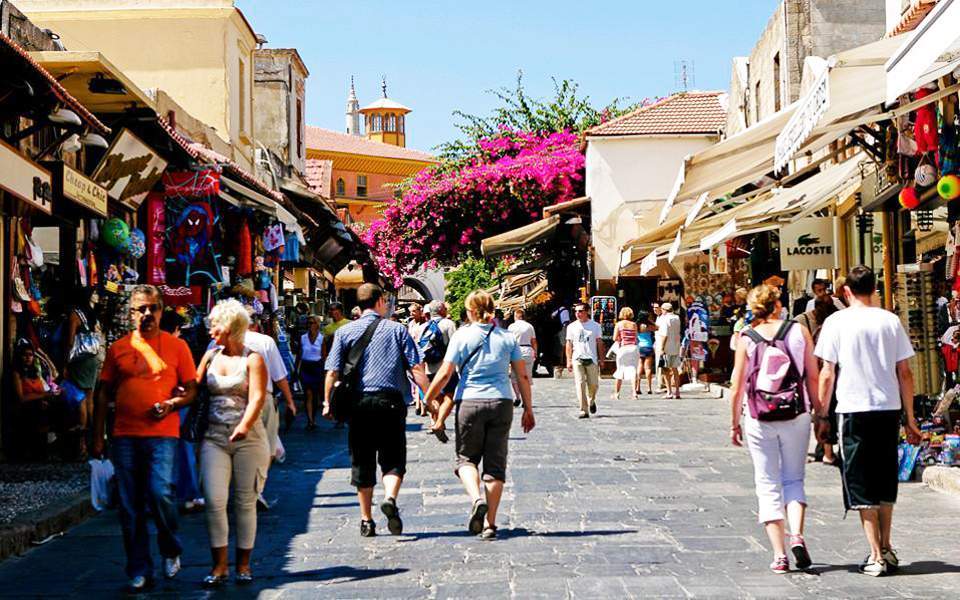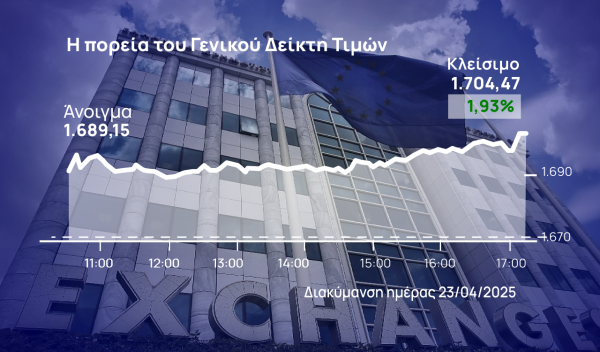
With a strong presence, modern and fresh images of destinations unknown to the average German, from Samothraki and Tzoumerka to Lake Plastira, attractive tourist packages but also the promotion of classic favorite tourist destinations such as Crete, Greece participates renewed in the International Tourism Exhibition ITB in Berlin, which ends today.
After a three-year hiatus due to the pandemic, ITB is back, opening its doors this year only to industry representatives. It is the largest exhibition of its kind worldwide, which also in the case of the Greek tourism industry, which has acquired its own strong “brand name”, offers important opportunities for contacts and new agreements with tour operators, airlines and other representatives of the German and international tourism.
With 75 exhibitors from across the spectrum of the tourism sector, which represents 25% of Greece’s GDP, the large-scale and interactive multimedia-enriched Greek pavilion is one of the busiest and most talked-about areas of this year’s ITB, reflecting the serious effort of many years of the Greek tourism sector.
Greece is consistently high on the tourist map
The news about Greek tourism in Berlin is extremely pleasant and promising. “Greece expects this year an increase of 10% compared to 2022, based on the reservations so far, provided of course that there will be no extraordinary events that can overturn the plan,” said the General Secretary of Tourism Policy and Development Olympia Anastasopoulou.
As demonstrated by this year’s ITV, Greece remains firmly in the top five destinations in Europe. It is in fact the “number 1” destination for tourist investments in Europe, according to Olympia Anastasopoulou, emphasizing that 8 out of 10 tourist investments in Europe concern Greece. Greece, with its new tourism strategy, now emphasizes the temporal and spatial extension of the tourist season to twelve months, and indeed not only on the well-known islands but throughout Greece.
“Greece is not only Mykonos and the Cyclades, it is the inland, the Peloponnese, northern Greece, the Ionian,” she characteristically says. In fact, the burden now also falls on the development of new forms of tourism, such as the tourism for elderly persons and pensioners, medical tourism or the attraction of digital nomads, providing a series of incentives. It is worth noting that Greece traditionally places special emphasis on the German tourist public and in this light Mrs. Anastasopoulou – representing the Minister of Tourism Vassilis Kikilias who did not travel to Berlin – also met with the German coordinator for Maritime Economy and Tourism Dieter Janetsek from the Greens, emphasizing issues of environmentally friendly tourism and sustainability.
The shadow cast by the Tempi disaster
From then on, however, the shadow cast by the tragedy in Tempi was also heavy on the ITV exhibition. Olympia Anastasopoulou expressed her deep sadness for the train accident, but, as she noted, “we are still here to work for tourism”, a sector that is a “source of joy and optimism” for Greece. “The state has assumed its responsibility for Tempi and has already taken the appropriate actions so that it does not happen again in the future and that the responsibilities are attributed to them in their entirety,” he said after a question from DW. He even underlined that “the country’s image will not be tarnished” because Greece has an “excellent level of tourism service provision”.
On the other hand, there is widespread sadness and concern, especially among local organizations and businessmen, about possible effects on the image of Greece among the tourist public. There are areas e.g. in Thessaly that have been using the train in recent years for interesting sustainable and economical tourist packages of alternative routes and the latest developments are causing concern for their future. The cancellations of foreign tourists after the painful accident in Tempi are of course nil to minimal for now, however everyone in the region – and not only – hopes for a quick restoration of the network with immediate implementation of its digitization.
As reported to DW by exhibitors from Alexandroupoulis and Kavala, to Thessaloniki, Thessaly and Epirus, the bitter truth is that everyone has known for a long time that the Greek railway network, especially in the periphery, is discredited in contrast to e.g. modern road junctions of Egnatia or Ionia Odos. As it is also a given for the tourist world that foreign tourists do not prefer the train in Greece for many reasons: either because they don’t know about it, or because they arrive directly by air to their destinations, or because they rent cars.
Latest News

IMF: US Tariffs Shake Global Economy, Outlook Downbeat
IMF slashes global growth forecast to 2.8% as U.S. tariffs create uncertainty and ‘negative supply shock

First Step Towards New Audiovisual Industry Hub in Drama
The project is set to contribute to the further development of Greece’s film industry and establish Drama as an audiovisual hub in the region

Airbnb Greece – Initial CoS Ruling Deems Tax Circular Unlawful
The case reached the Council of State following annulment applications filed by the Panhellenic Federation of Property Owners (POMIDA)

Mitsotakis Unveils €1 Billion Plan for Housing, Pensioners, Public investments
Greek Prime Minister Kyriakos Mitsotakis has announced a new set of economic support measures, worth 1 billion euros, aiming to provide financial relief to citizens.

Alter Ego Ventures Invests in Pioneering Gaming Company ‘Couch Heroes’
Alter Ego Ventures' participation in the share capital of Couch Heroes marks yet another investment by the Alter Ego Media Group in innovative companies with a focus on technology.

Corruption Still Plagues Greece’s Driving Tests
While traffic accidents continue to claim lives on Greek roads daily, irregularities and under-the-table dealings in the training and testing of new drivers remain disturbingly widespread

Pope Francis Died of Stroke and Heart Failure Vatican Confirms
As news of the official cause of death spread, tributes poured in from across the globe. The 1.4 billion-member Catholic Church is united in grief, remembering a pope who championed inclusion, justice, and compassion

Increase in Both Museum Visits, Revenues for 2024
As expected, the Acropolis was the top archeological site in the country, followed by Sounion, Mycenae, the ancient theater of Epidaurus, and Vergina in northern Greece

Where Greece’s Tourists Come From: A Look at 2025’s Top Visitor Markets
The United Kingdom continues to hold the top spot as the largest source of incoming tourism, with 5.6 million seats booked for Greece this summer — up 2.2% from last year. This accounts for 20% of all international air traffic to Greece

Pope Francis: A Pontiff Who Reshaped the Papacy and Sparked a Global Conversation
His first words from the balcony of St. Peter’s Basilica—“Brothers and sisters, good evening”—set the tone for a pontificate that would challenge norms, favor mercy over dogma, and bring the papacy closer to the people.












![Πλημμύρες: Σημειώθηκαν σε επίπεδα ρεκόρ στην Ευρώπη το 2024 [γράφημα]](https://www.ot.gr/wp-content/uploads/2025/04/FLOOD_HUNGRY-90x90.jpg)



![Ξενοδοχεία: Μεγάλο το ενδιαφέρον για επενδύσεις στην Ελλάδα – Η θέση της Αθήνας [γραφήματα]](https://www.ot.gr/wp-content/uploads/2025/03/Athens-hotels-90x90.jpg)
























 Αριθμός Πιστοποίησης
Αριθμός Πιστοποίησης